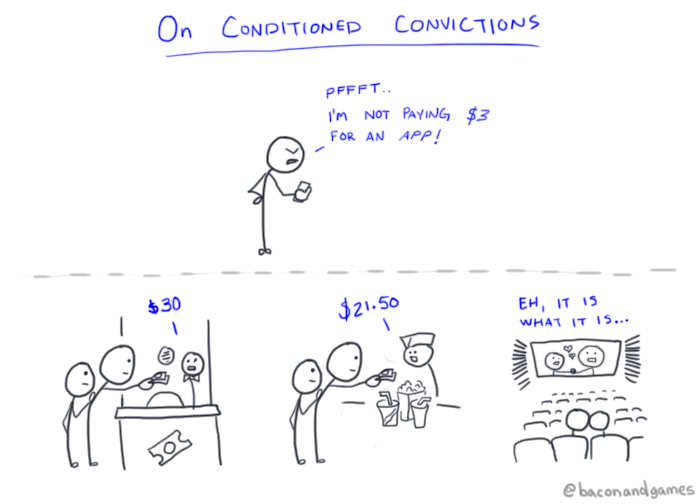I really wanted to keep this series motivational and this installment is anything but, however I just had to get this out.
I realize we as an industry are largely responsible for setting low price expectations for mobile content. When the App store first opened and nobody knew how to stand out, giving your app/game away seemed like a good approach… and for many it was. Now that the App Store is a bit more mature (and has demonstrated the immense value it can bring to our lives) the bar hasn’t risen much in terms of pricing power. In fact, with the advent of free-to-plays the situation has only worsened.
It saddens me that the average person cannot (or will not) step back and assess the value of an app/game against the greater context of their life, rather than cling to an unrealistic expectation that pocket content should be both high quality and totally free.
A movie for two and a few nibbles can easily cost $60, lasts 90 minutes and cannot be seen again for free. A $50 membership to Costco just for the privilege of spending money is for many no trouble at all. $40 to not cook for an evening. $5 for a beer served when you can get 24 at home for the cost of 4 in public. $6 Starbucks frappa-mocha-whateverthehell. $2 ATM fee. An impulse candy bar at the checkout: $1.50. And $0.35 to use a debit card while a credit card (if used properly) is completely free.
There’s nothing wrong with the purchases above, I’m “guilty” of most of them. They’re all valid ways to spend your hard earned cash. And while I don’t think people should WANT to spend money on apps, when I consider those purchases against people’s unwillingness to pick up an app or game for more than 99 cents it just boggles my mind. The recent outcry against ustwo’s Monument Valley expansion being $1.99 (instead of the entitleds’ expectation of free) really jarred this loose for me.
The gist is that folks who were clambering for more Monument Valley were incensed when asked to pay an additional $2 to unlock the new content on top of the initial $4 they had already paid. Why? Because updates are free? However you look at it, they were asking 2 bucks for extra content that doubled the length of the game for half the initial price. And that’s completely discounting the fact that you can replay it (as many have) or the ability for others to play your copy as well. (and forgetting the fact that good hard working people who need to feed themselves and their families built these, which is a humanistic thread I’m not even going to pull in this article)
So let’s look at this from a purely logical perspective. If you figure a movie costs $15 and lasts even 2 hours, that’s $7.50/hour for something you can’t re-watch or share. Compare that to mobile content which conservatively will yield 3 hours of fun for $6 or $2/hour… and you can replay it… and share it with others later.
Monument Valley is nearly 4x more valuable to you than another Hollywood dice roll… and oh yeah, you got to purchase it in pieces. Didn’t like the first half? Don’t buy the expansion and put that extra $2 toward part of a cup of coffee. How many movies will let you buy half up front and then allow you to walk out at intermission if it turns out to be John Carter?
Spoiler alert: None. No movie ever.
And by this logic if you paid $15 to see the first Hunger Games movie, you should expect that the next 3 movies be free for you or at least severely discounted. Right.
When you get right down to it, the cost of most apps and games on the App Store is probably less than the value of the food we routinely leave on our over-piled restaurant plates at the end of a meal.
“So, how was everything… do we have room for desert?”
No, but we’re going to get it anyway and then talk about how full we are later. It’s a good thing the Yelp app is free, otherwise we might never have found our way to this $6 piece of chocolate cake we’re going to joke about not burning off with our $20/month gym membership we like to constantly remind people that we never use and should probably cancel.
Yet. “Pffft! $2.99 for an app? Get out of here.”
I don’t think people are dumb. I don’t think people are insensitive or inherently mean spritied. But I do think many of them have been conditioned (again, largely by the very industry being hurt by this hive-mind mentality) to dramatically undervalue mobile content. And I think it’s sad that the average person doesn’t have the wherewithal to step back and consider how far askew these expectations are compared to all the other money they burn on stuff they’re just used to burning it on.


